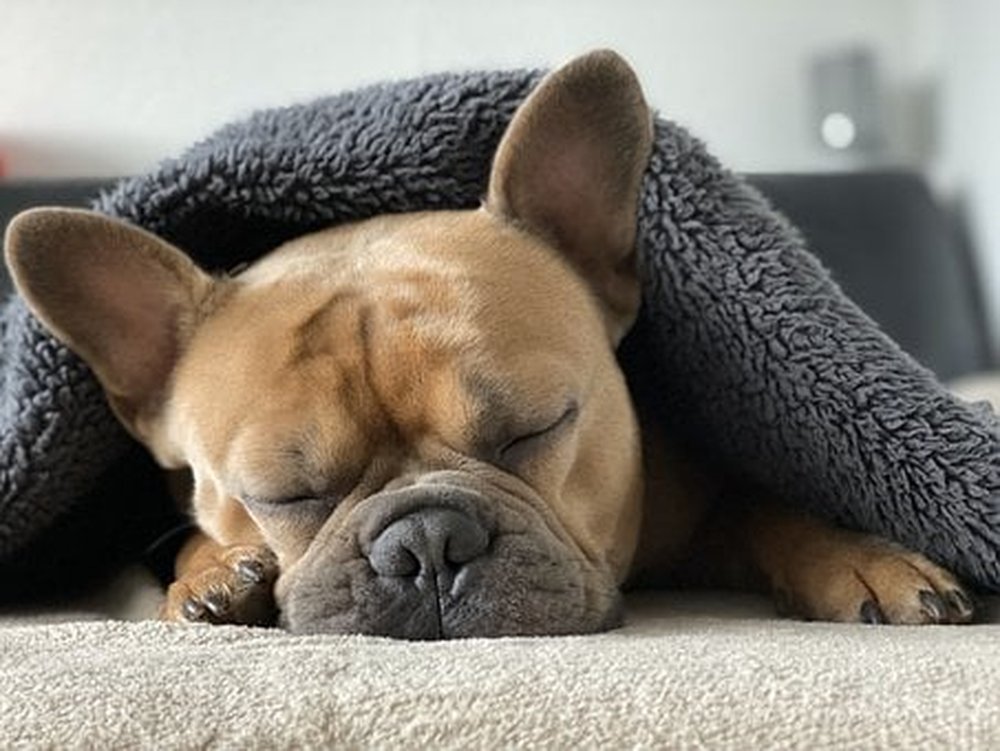Have you ever noticed your French Bulldog breathing fast while sleeping? It may seem alarming at first, but this behavior is actually quite common among this breed. French Bulldogs have a unique respiratory system, and their breathing patterns can vary, especially during sleep. Understanding why they breathe fast can help put your mind at ease and ensure their well-being.
French Bulldogs are prone to respiratory issues due to their short snouts and flat faces. This characteristic, known as brachycephaly, can lead to breathing difficulties, especially when they are in deep sleep or experiencing dreams. The fast breathing during sleep is often a result of the dog’s body trying to compensate and get enough oxygen. While occasional fast breathing may be normal, it’s essential to monitor your French Bulldog’s breathing and seek veterinary advice if you notice any severe or persistent respiratory issues.
French Bulldogs may sometimes breathe fast while sleeping. This is usually due to their brachycephalic (short-nosed) anatomy, which can cause breathing difficulties. However, if your French Bulldog is consistently breathing fast or struggling to breathe while asleep, it’s essential to consult a veterinarian. They can evaluate your dog’s respiratory health and determine if any underlying conditions or complications are present. Regular veterinary check-ups are crucial for monitoring your French Bulldog’s breathing and overall well-being.

Understanding French Bulldog Breathing Patterns During Sleep
French Bulldogs are known for their distinctive appearance and playful nature. However, one concern that many French Bulldog owners have is their breathing patterns while sleeping. It’s not uncommon for French Bulldogs to breathe fast or have other breathing irregularities during sleep. In this article, we will explore the reasons behind this behavior and provide insights into what is considered normal for French Bulldogs while they sleep.
Understanding your French Bulldog’s breathing patterns during sleep is essential for ensuring their well-being and peace of mind for their owners. Let’s delve deeper into this topic.
Why Do French Bulldogs Breathe Fast While Sleeping?
French Bulldogs, like other brachycephalic breeds, have unique respiratory systems that can make breathing more challenging. Their short snouts, narrow nostrils, and elongated soft palates can contribute to difficulties in breathing, especially during physical exertion or periods of excitement.
During sleep, French Bulldogs may breathe faster than usual, and this can be attributed to various factors:
- Heat regulation: French Bulldogs have a tendency to get overheated, and their fast breathing during sleep helps regulate their body temperature.
- REM sleep: Rapid Eye Movement (REM) sleep is the stage of sleep where vivid dreams occur. During this stage, dogs may exhibit faster breathing, similar to humans.
- Dreaming: Like other dogs, French Bulldogs may dream during sleep, which can cause changes in their breathing patterns, including fast or irregular breathing.
While it is normal for French Bulldogs to breathe fast during sleep, it is essential to be aware of any signs of distress or difficulty breathing that persist beyond sleep. If you notice excessive snoring, gasping, wheezing, or coughing, it is advisable to consult a veterinarian for a thorough examination.
Other Common French Bulldog Breathing Patterns During Sleep
Aside from fast breathing, French Bulldogs may exhibit other breathing patterns during sleep that are considered normal for the breed:
Snoring: Many French Bulldogs are notorious snorers. Their short snouts and elongated soft palates can cause snoring sounds during sleep. However, if the snoring is excessively loud or accompanied by other symptoms like choking or gasping, it is best to consult a veterinarian.
Brachycephalic Sleep Apnea: French Bulldogs, being brachycephalic breeds, are susceptible to sleep apnea. During sleep apnea episodes, the dog’s breathing temporarily stops or becomes shallow, leading to disrupted sleep. If you suspect your French Bulldog has sleep apnea, consult a veterinarian for further evaluation.
Tips for Monitoring Your French Bulldog’s Sleep
While it’s natural for French Bulldogs to exhibit certain breathing patterns while sleeping, it’s essential to stay vigilant and monitor their sleep for any signs of distress. Here are some tips for observing and ensuring your French Bulldog’s sleep:
- Listen for any unusual sounds like excessive snoring, wheezing, or gasping.
- Observe their breathing rate and depth while they sleep. Fast breathing during REM sleep or after physical activity is normal, but persistent rapid breathing may require further investigation.
- Monitor their body temperature during sleep and ensure they are not overheating. Provide a cool and well-ventilated sleeping environment.
- Regularly check their overall health and consult a veterinarian if you notice any concerning changes in their breathing patterns or other symptoms.
When to Consult a Veterinarian
While intermittent fast breathing during sleep is considered normal for French Bulldogs, there are instances when it’s crucial to seek professional veterinary assistance:
Chronic fast breathing: If your French Bulldog consistently exhibits fast and shallow breathing during sleep, it’s essential to consult a veterinarian to rule out any underlying respiratory issues or sleep disorders.
Excessive snoring: If your French Bulldog’s snoring is excessively loud or accompanied by choking or gasping sounds, it could indicate an obstructed airway or sleep apnea. A veterinarian can evaluate your dog and provide appropriate guidance.
Other symptoms: If you notice any additional symptoms like coughing, wheezing, difficulty breathing while awake, or lethargy, it’s crucial to seek veterinary attention promptly. These symptoms may indicate underlying health issues that require timely intervention.
Conclusion
French Bulldogs may breathe fast while sleeping, which is generally considered normal for the breed. However, it is important for owners to stay vigilant and monitor their French Bulldog’s sleep for any signs of distress or abnormal breathing patterns. If you notice any consistent symptoms or changes in their breathing during sleep, it is advisable to consult a veterinarian to ensure the well-being of your beloved pet.
Key Takeaways: Do French Bulldogs Breathe Fast While Sleeping?
French Bulldogs may breathe fast while sleeping due to their brachycephalic (short-faced) anatomy and certain health conditions.
1. French Bulldogs have a higher risk of breathing difficulties due to their short snouts.
2. Rapid breathing during sleep can be caused by dreams or a common sleep disorder called REM sleep behavior disorder.
3. Other possible causes include respiratory infections, allergies, obesity, or underlying heart or lung issues.
4. If your French Bulldog’s fast breathing is accompanied by other symptoms like coughing or wheezing, it’s important to consult a veterinarian.
5. Monitoring your French Bulldog’s breathing patterns and ensuring a healthy weight can help mitigate breathing issues during sleep.
Frequently Asked Questions
Here are some common questions about the breathing patterns of French Bulldogs while they sleep:
1. Why do French Bulldogs breathe fast while sleeping?
French Bulldogs may breathe fast while sleeping due to their brachycephalic (short-nosed) anatomy. This breed is prone to respiratory issues, and their shorter airways can make it more difficult for them to breathe efficiently. When they sleep, their muscles relax, and this can lead to increased respiratory effort, resulting in faster breathing.
Additionally, French Bulldogs may also breathe fast while sleeping if they are dreaming or experiencing periods of deep sleep. Just like humans, dogs can have vivid dreams that can trigger faster breathing. It’s important to note that if your French Bulldog’s breathing is excessively fast or accompanied by other concerning symptoms, it’s best to consult with a veterinarian to rule out any underlying health issues.
2. Is it normal for French Bulldogs to snore and breathe heavily while sleeping?
Yes, it is relatively common for French Bulldogs to snore and breathe heavily while sleeping. This breed’s facial structure, specifically their shorter snouts and elongated soft palates, can contribute to these breathing sounds. Snoring and heavy breathing can be more pronounced during sleep because the muscles in the throat and airway are more relaxed, leading to partial blockages and vibrations.
While occasional snoring and heavy breathing may be considered normal for French Bulldogs, persistent loud snoring or breathing difficulties can indicate a more serious issue, such as brachycephalic airway syndrome. If you notice these symptoms accompanied by coughing, wheezing, or difficulty breathing, it is important to have your dog evaluated by a veterinarian.
3. Can I help my French Bulldog breathe better during sleep?
Yes, there are some measures you can take to help your French Bulldog breathe better during sleep:
1. Keep their sleeping environment cool and well-ventilated to prevent overheating, which can exacerbate breathing difficulties.
2. Use a supportive bed or pillow that elevates their head and neck slightly, helping to open up their airways and reduce snoring.
3. Avoid exposure to irritants such as smoke, strong perfumes, or chemicals that can further irritate their respiratory system.
4. Regular exercise can help improve overall respiratory function. However, it’s important to avoid excessive exercise in hot or humid weather to prevent overheating.
4. Should I be concerned if my French Bulldog’s breathing is excessively fast while sleeping?
If your French Bulldog’s breathing is excessively fast while sleeping, it is important to evaluate their overall behavior and any other accompanying symptoms. While some degree of fast breathing can be normal during sleep, there are certain red flags to watch out for:
1. Labored or struggling breathing that doesn’t improve even after waking up.
2. Excessive panting or breathlessness.
3. Changes in gum or tongue color, such as bluish or pale appearance.
4. Coughing, wheezing, or choking sounds.
If you observe any of these symptoms or feel concerned about your French Bulldog’s breathing, it’s best to consult with a veterinarian for a thorough examination and appropriate recommendations.
5. Are there any specific sleep positions that can help alleviate breathing difficulties in French Bulldogs?
While there are no specific sleep positions guaranteed to alleviate breathing difficulties in French Bulldogs, some pet owners have found certain positions to be more comfortable for their dogs. These include:
1. Elevated head position: Using a slightly elevated bed or pillow can promote better airflow and reduce snoring.
2. Side-lying position: Some dogs find relief in sleeping on their sides, which can help open up their airways and reduce pressure on the neck.
3. Adjusting position: French Bulldogs may naturally adjust their sleep positions throughout the night to find the most comfortable breathing position. Allow them the flexibility to find a position that suits them best.
It’s important to remember that each dog is unique, and what works for one may not work for another. If you have concerns about your French Bulldog’s breathing, consult with a veterinarian for personalized advice and guidance.

In conclusion, it is normal for French Bulldogs to breathe fast while sleeping. During sleep, dogs, including French Bulldogs, enter a state of deep relaxation known as REM sleep. In this phase, their breathing can become irregular and more rapid, resembling panting at times.
This is a natural behavior and does not necessarily indicate any health issues. However, if the breathing seems excessively labored or there are accompanying symptoms like wheezing or coughing, it’s important to consult a veterinarian to rule out any underlying respiratory or cardiac problems.
